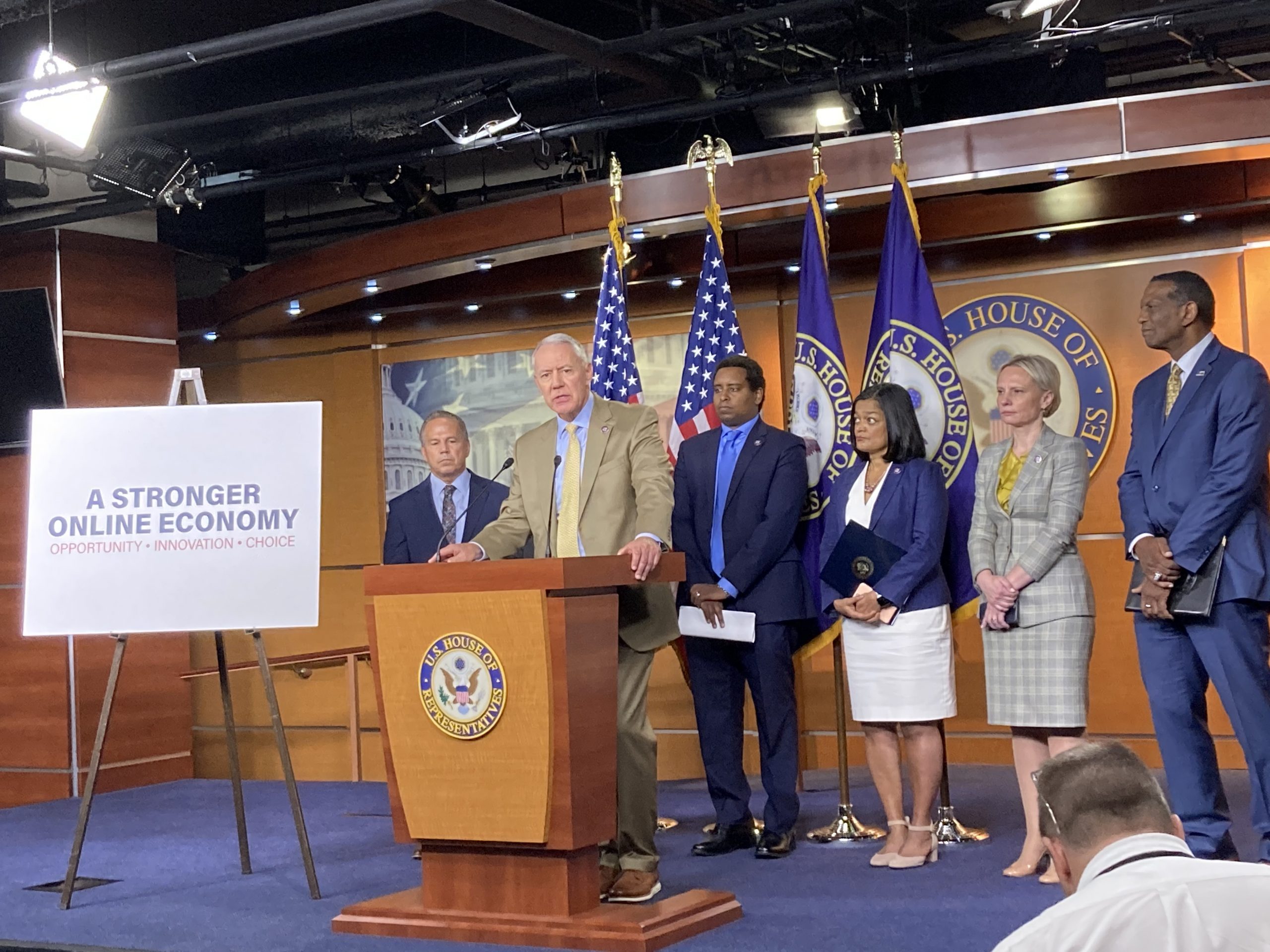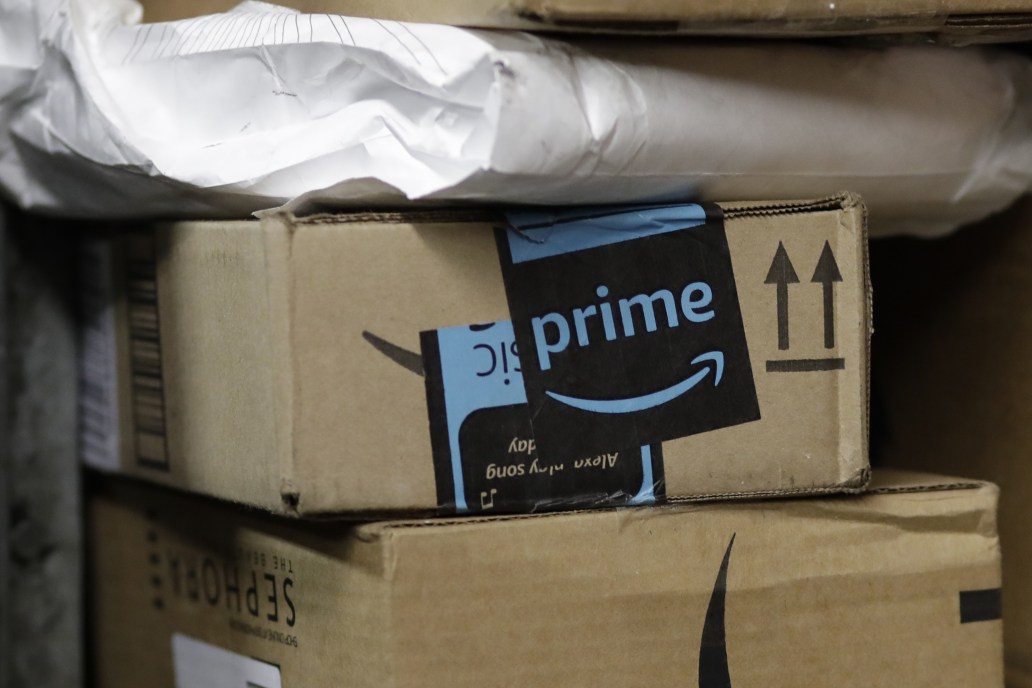
Rep. Ken Buck never thought he’d be leading an antitrust charge.
The Windsor Republican, who represents much of the Eastern Plains, said if you had asked him about sponsoring antitrust bills 18 months ago, you would not have gotten a positive response.
“I was very much a market person. I looked at this and said, the market will take care of this. At some point, Amazon will start fading and, and other companies will rise and the marketplace can handle this,” he recalled.
In 2019, the House Judiciary’s Antitrust, Commercial, and Administrative Law subcommittee, where Buck is currently the highest-ranking Republican, embarked on a top-to-bottom investigation into the business conduct of technology’s Big Four -- Amazon, Apple, Facebook and Google.
Over the course of that investigation, Buck said, his opinion changed, especially as he learned more about their business practices.
“Big tech has routinely used their gatekeeper power to crush competitors, harm innovation, distort and destroy the free market and silence conservatives,” he said.
In Colorado’s neighboring 2nd Congressional District, but on the other end of the political spectrum, Democratic Rep. Joe Neguse is also concerned about how big tech has used its dominance.
“At the end of the day, competition is central to American economic growth and innovation. Every American agrees on that front,” he said.
Neguse was the subcommittee’s vice chair during the course of the investigation. He brought the subcommittee to Boulder for a field hearing with testimony from rival executives about how Big Tech was hindering or hurting their businesses. The committee put out a 400-plus page report on its findings and recommendations, while Buck released a shorter report, The Third Way, with some different recommendations.
“I think the fact that we took our time and we were thoughtful and methodical in terms of the investigation that we conducted, ultimately, will pay dividends in terms of now being able to build a... set of legislative bills that are likely to receive a quick and positive consideration from our colleagues,” Neguse said.
That legislative portfolio is now out.
Rep. David Cicilline of Rhode Island, chair of the subcommittee, introduced the package of bills of reign in the monopolistic practices of the big tech companies earlier in June.
New York Rep. Jerry Nadler, chair of the House Judiciary committee, said he plans to bring the suite of bills up for debate in committee this week. “These bills will pave the way for a stronger economy and a stronger democracy for the American people,” he said.
A bipartisan push
You know how they say politics makes for strange bedfellows? It’s an apt description for the bipartisan group of lawmakers, including Buck and Neguse, that are pushing these bills. The group includes progressives and conservatives; some were impeachment managers, while others are some of former president Donald trump’s staunchest supporters. Buck said their collaboration here shows the urgency of this issue.
“We've been through a very tumultuous time in the last few years, and we're able to put our differences aside and focus on something that's really important to America. And I'm very proud to be part of that effort.”
Neguse said, “This is how congressional oversight should work — done on a bipartisan basis to solve a consequential challenge that faces our country and our society.”
Neguse added the package takes necessary steps to ensure the free market can flourish. “Congress has a vital role to play in ensuring that ultimately markets are working in a way that benefits consumers, benefits small businesses, innovation, and ultimately our democracy.”
Despite their ideological differences, it’s not overly surprising that Buck and Neguse are working together on this. The two Colorado lawyers both sit on the relevant committees and are friends, which was on display during a Capitol Hill press conference about the bills. Neguse joked he thought he was the most fashionable member of the Colorado delegation until he saw Buck in his tan suit.
Fashion aside, while they can and do disagree politically on issues, they have also proven to be nuanced, thoughtful and pragmatic lawmakers, who can at times work across the aisle. They’re already cosponsoring legislation together about Camp Amache. Neguse established a bipartisan wildfire caucus with GOP Rep. John Curtis of Utah to figure out ways to help communities dealing with the threat of wildfire and has received high bipartisanship scores from groups.
This is Buck’s most prominent bipartisan cause. Instead, he’s stuck to his conservative principles, which sometimes put him at odds with opinion polls or even his party. For example, he was the only Republican in Colorado’s House delegation to vote for the election certification, and he has consistently voted against coronavirus relief packages, citing government debt.
If this push is successful, it could be one of the biggest legislative accomplishments for both of them so far. Taken altogether, the portfolio would broadly update monopoly laws for the 21st century.
What’s being proposed
The package touted as “A Stronger Online Economy: Opportunity, Innovation, Choice” agenda is comprised of five bills.
One, the Augmenting Compatibility and Competition by Enabling Service Switching (ACCESS) Act, would make it easier for people to take their data with them when they switch online services, sort of like how you can currently take your phone number to different cellphone carriers.
Another, The American Innovation and Choice Online Act, introduced by Cicilline, would stop discriminatory conduct by dominant platforms — putting their products ahead of the competition.

Neguse, who ran Colorado’s regulatory department before running for Congress, has introduced the Merger Filing Fee Modernization Act, which updates the fees companies pay when they want to buy another entity in order to better fund the country’s antitrust agencies. “I know how critical it is for our enforcement agencies to have the necessary resources and the tools to do their job,” he said.
A fourth bill, the Ending Platform Monopolies Act, would prevent the biggest companies from owning or operating a business that creates a conflict of interest. And the last, the Platform Competition and Opportunity Act, would stop tech giants from buying competitors — think Facebook’s purchase of Instagram. Buck is the lead Republican co-sponsor of that bill.
Groups that have been pushing back against the current practices of the tech giants welcomed the package. Sally Hubbard, Director of Enforcement Strategy at the anti-monopoly Open Markets Institute, is excited about everything in it, and in particular the merger bill, which shifts the burden of proof to the companies. She said that’s a big deal.
“If they want to acquire a company, they have to prove by clear and convincing evidence that it's not anti-competitive, that they're not acquiring a competitive threat or a company that is going to make them even more powerful monopolies,” she said.
But that’s a concern for Jennifer Huddleston, director of technology and innovation policy at American Action Forum, a center-right think tank. “It shifts the burden from a need for the government to show that something is harmful to a company to show that it's not harmful. Sometimes it's more difficult to prove a negative.”
Chairman Cicilline is anticipating pushback. He said there’s a reason for this strategy of having multiple bills. Part of it is that this is a big issue with lots of areas that need focused attention. The other is the politics of taking on Big Tech.
“The reality is we're fighting enormous companies. You know, with tremendous economic power comes tremendous political power. I think my friend Ken Buck refers to it as... ‘the swamp’ of Washington. They're going to mobilize hard against these reforms,” Cicilline said. “They want to preserve all of this anti-competitive behavior because it's enriching them, it's creating tremendous wealth and tremendous market power.”
Already, some members of Congress have made it clear they’re not on board with the proposals; either because the package doesn't deal directly with what they see as online censorship or because they’re concerned more regulation is just Big Government.
Republicans on the House Judiciary Committee recently, which counts Buck as a member, sent out a Breitbart article warning the package is a “massive gamble.” The article complains the bills would put too much power in the hands of Biden-appointed officials while failing to do anything about conservatives’ main concerns.
Buck had a message for his GOP colleagues who might be on the fence: “For my conservative friends, concerned about Big Tech power over information and speech. The only way to stop this power is through antitrust reform. These bills address that power.”
Buck said what the country can’t do is kick the can down the road and wait.
Even if only some of the bills make it through Congress and to the president’s desk, Mitch Soltz, senior staff attorney at the Electronic Frontier Foundation, said it will still make a big difference.
“I think any of these bills standing alone would be a huge help,” he said. “I don't think they all have to be passed as a package, although they certainly reinforce one another.”








